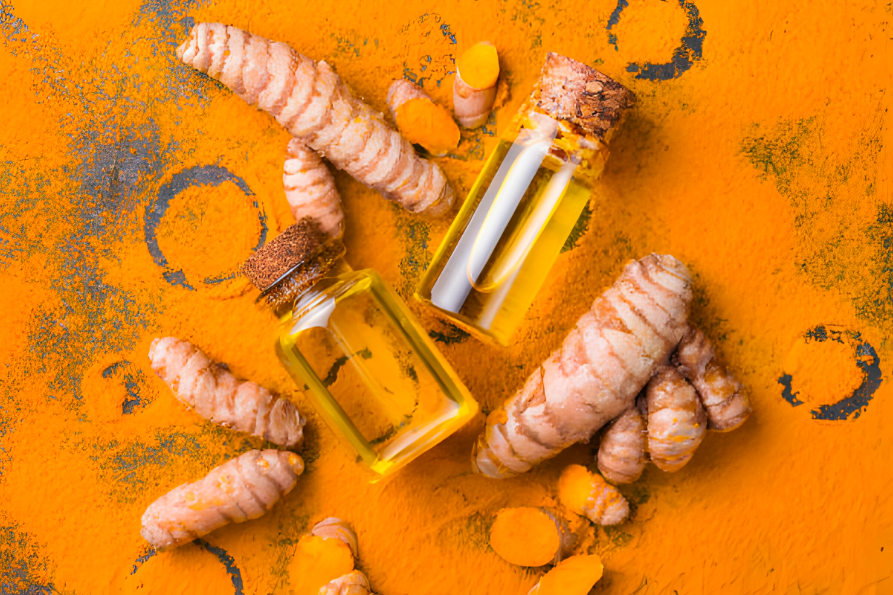Turmeric lies on the list of the most widely and commonly used spices throughout the world. It is an essential culinary ingredient that offers numerous benefits on account of a special nutrient known as curcumin.
In many Asian countries, around 1 billion people use turmeric as an essential spice in their daily cooked meals.
Here in this article, you will get to know about 15 interesting health benefits that a single spice, i.e., turmeric, offers alone.
What is Turmeric?
Turmeric is a spice that is famous for its flavor and color. It not only offers a vibrant yellow color to your food but has been used since ancient times for medicinal purposes due to its anti-oxidant as well as anti-inflammatory role.

Turmeric was traditionally used to treat wounds as well as major problems, including arthritis. Nowadays, it has become a part of staple food, offering a fascinating flavor and color.
The characteristic yellow color of turmeric is offered by its active ingredient, curcumin. Curcumin is so named due to the derivation of turmeric from the root of a plant called Curcuma longa. This plant has been observed to grow mainly in India and other South Asian countries.
What is Curcumin?
Curcumin, as mentioned above, is the main active ingredient of turmeric. Turmeric makes up somewhere between 1-7 percent (on average, about 3%) of the root (30).
Still, it accounts for most of the health or medicinal benefits offered by turmeric.

If we dive deep into the study of curcumin, it belongs to a class containing above 8000 polyphenols, which are plant-based antioxidant compounds. Due to this character, turmeric offers protection against several diseases, including
- Neurodegenerative diseases
- Heart disease
- Cancer
- Diabetes
How Much Turmeric do you need to use Daily for Medicinal Benefits?
Although turmeric has proved to give relief to pain, inflammation, and other. However, according to nutritionists, turmeric is not absorbed abundantly when you consume it throughout your meal.
This might be one of the reasons that the FDA (U.S. Food and Drug Administration) has not yet established the recommended dietary amount of turmeric per day.
It means that if you want to gain long-term advantages quickly, you will need to take your hands on turmeric supplements.
But in case you are not a fan of taking supplements, you need not worry because there is another option as well.
Science has observed that an active ingredient named piperine found in black pepper has proven to increase the efficiency of our body to absorb more turmeric than usual.
In other words, you can say that adding black pepper every time you use turmeric enhances its bio-availability of turmeric. The term bio-availability means the amount of a substance that is available for the body to absorb.
15 Health Benefits of Turmeric
People have been using turmeric since ages because of its ability to prevent and cure some diseases. Moreover, consuming turmeric in moderate quantity offers many health benefits.
Here’s a list of the top 15 perks of using turmeric.
1. Prevents Cancer Risk
- According to recent research, turmeric extract, which contains curcumin, can prevent the risk of cancer, which was not shown by alternate treatments.
- Scientific experiments have shown that curcumin and turmeric can inhibit the growth of several kinds of tumor cells, specifically in colorectal cancer, pancreatic cancer, and prostate cancer.
- The main role of turmeric in the prevention of cancer is the protection against free radicals is of curcumin, which is a powerful antioxidant. It also induces the death of cancer cells, known as apoptosis, and regulates the immune response against cancerous cells.
2. Improves Liver Functioning
- The free radicals that can be acquired by contact with the sun or may be present in foods can act as toxins that can pose a threat to your liver.
- However, the antioxidant effect of curcumin is so strong that it can protect your liver from damage caused by toxins.
- Furthermore, it is also being suggested that curcumin can also have a role in protecting against fatty liver disease and even in preventing liver fibrosis.
3. Reduces inflammation
- Whenever we talk about the medicinal benefits of turmeric, its anti-inflammatory role holds the top position on the list.
- Information is a natural response of your body to some infection or stress, but if left untreated, it can pose harmful effects on your joints, gut, and other body parts.
- Turmeric modulates the main pathways against inflammation and also blocks the production of inflammation-causing compounds.
4. Boosts Memory and Mood
- The improvement of human memory and mood is again one of the most important advantages of turmeric, and the credit goes to its anti-inflammatory and antioxidant properties.
- Due to these properties, curcumin can lower the damaging effects of free radicals and hence unsterilized the compounds that have a main role in the impairment of memory and neurodegenerative disorders such as Alzheimer’s disease, dementia, and other mood disorders.
- Curcumin also increases the amount of chemicals present in the brain that have a direct link with the formation and growth of memory.
5. Aids in Digestion
- Curcumin present in turmeric also gives a stimulus to the gallbladder to produce bile, which helps to prevent and treat the inflammation of the pancreas known as pancreatitis.
- It also lowers bloating and helps maintain the proper function of the digestive system.
- It also improves the health of bacteria present in the gut, maintaining the on-track performance of our digestive system.
6. Prevents Parkinson’s Disease
- Parkinson’s disease is a brain disorder that causes issues with mental health, movement, and sleep, causes pain, and causes other health problems.
- Many scientists support the idea that the main reason behind Parkinson’s disease is a collection of environmental and genetic factors, such as exposure to toxins.
- Turmeric can help prevent Parkinson’s disease by protecting the nervous system against toxins that can cause degeneration in the nervous system.
7. Helps cure Alzheimer’s Disease
Alzheimer’s disease is the most common form of dementia, or, as you can simply say, memory loss. It generally starts with a little memory loss but can lead to an inability to continue a conversation or be in a responsible environment Alzheimer’s disease is a brain disorder that is mainly involved with those parts of the brain that have control over memory, thought, and language.
Turmeric and curcumin, on account of their anti-inflammatory properties, can lower inflammation, enhancing and making possible the cure of several forms of dementia, including Alzheimer’s disease.
8. Controls High Blood Pressure
Curcumin in turmeric is also observed to enhance the endothelial function of the membrane covering the inside of the heart and blood vessels.
This membrane is responsible for the regulation of blood pressure, blood clotting, and other factors.
If there is an impairment in endothelial function, the risk of heart disease increases. Curcumin can help prevent the loss of endothelial function, mainly coupled with age, and hence lower the risk of heart diseases, including high blood pressure.
9. Controls Diabetes
Curcumin inhibits the production of inflammatory compounds such as cytokines and, as a result, helps delay the onset of type 2 diabetes.
Alongside the antioxidant and anti-inflammatory properties of turmeric, curcumin can also improve the factors contributing to diabetes, including high blood sugar, insulin resistance, and hyperlipidemia (high levels of LDL, or bad cholesterol).
10: Lowers Risk of Chronic Diseases
The major cause of chronic diseases is free radicals that a person can acquire through environmental and behavioral factors such as contact with air pollutants, smoking, and alcohol consumption.
Curcumin, in its extraordinary anti-inflammatory and antioxidant properties, serves as a major cure for several chronic diseases; it battles free radicals and inhibits the inflammatory pathways that relate to several diseases.
It improves health by reducing the level of bad cholesterol, protecting brain cells, and posing anticancer properties.
11. Prevents Depression and Anxiety
Recent studies have suggested that curcumin can affect the levels of dopamine and serotonin, which are the central brain chemicals related to behavior and mood.
Furthermore, it also protects brain cells from damage caused by stress and improves the effectiveness of antidepressants. So, adding turmeric to your food can help you lower your anxiety and depression.
12. Treats Arthritis
Arthritis is a disease in which there is swelling or inflammation in one or more joints. The curcumin present in turmeric features properties that can treat inflammatory arthritis as well as osteoarthritis.
Due to the antioxidant, anti-inflammatory, neuroprotective, and anti-cancer properties of turmeric, it can reduce the symptoms of arthritis, such as inflammation and stiffness of joints.
13. Helps in Weight Management
The key ingredient in turmeric, curcumin, is under research for its ability to help people manage their weight. Curcumin may affect inflammation, fat metabolism, metabolic rate, and weight control.
Per a study performed at Tufts University, curcumin can inhibit the growth of fat tissue. Turmeric also aids in weight loss by controlling blood sugar levels and avoiding insulin resistance.
As a result, the body produces extra fat that the body does not store.
14. Prevents & Cures Inflammatory Bowel Diseases
The active ingredient of turmeric, curcumin, can help reduce the onset of IBD by lowering the symptoms, including abdominal pain. Inflammatory bowel diseases are a collection of some disorders, including:
- Ulcerative Colitis
- Crohn’s disease
- Necrotizing Enterocolitis
- Ulcerative Proctitis
Turmeric has an effective role in the prevention and cure of IBD. This healing power of turmeric is due to curcumin’s anti-inflammatory and antioxidant properties.
15. Improves Skin and Brain Health
Turmeric, in addition to its popular anti-inflammatory properties, also features anti-microbial properties, both of which are important for healthy skin. It can fight against and prevent several skin problems, including:
- Psoriasis
- Acne
- Eczema
- Aging
As for brain health, curcumin increases the levels of brain chemicals that have a direct link with mood and memory. Hence, consuming turmeric is helpful both for boosting your memory status and for protecting your brain against dementia.
FAQs
How Can You Consume Turmeric and Curcumin?
The possibilities of adding turmeric to your routine are endless. Here are some of the widely used ways admired by most people:
- Spice your meal: A simple method is to add ground turmeric to your favorite recipes, like stews, soups, and roasted veggies. For an additional flavor boost, you can also add a little to smoothies or combine it with salad dressings.
- Golden Milk: Another delectable and widely amused drink is Golden Milk. a warm beverage mixed with turmeric, milk, and other spices. It is famous in Asian people to use golden milk for relief from injuries.
- Turmeric Tea: You can also grate a fresh turmeric root and add it to boiling water with a squeeze of lemon. And here, you have your cooling and refreshing tea prepared!
Is it safe to use Turmeric Supplements?
Turmeric supplements are generally regarded as safe for the majority of individuals when used in the prescribed dosage.
Curcumin, the main ingredient in turmeric, has been used for a very long time in traditional medicine and is generally well-tolerated.
However, turmeric supplementation can be questionable at some moments. In small dosages, they are usually harmless for most people,.
However, if you take a higher dose, these supplements can interact with other medications and cause adverse reactions.
So, before attempting them, make sure they are safe for you and won’t conflict with any other medications you are taking by discussing them with your doctor.
Who Should Not Take Turmeric?
Despite so many benefits, exceptions for some people remain. Doctors suggest that people suffering from some specific disorders should not make turmeric a part of their daily lives. Such people are those:
Having gallstones
- Anemic
- Taking statins to decrease cholesterol
- Having kidney stones
- Taking medicine to decrease blood sugar
- Breastfeeding
- Pregnant
- Trying to conceive
- Taking chemotherapy drugs
- Having blood pressure medication
- Taking blood thinners (or NSAIDs, aspirin)
Above mentioned people must consult their doctor before giving turmeric a chance for therapeutic applications.
Conclusion
Turmeric has been known for ages on account of its therapeutic properties. It is a renowned spice that most people use to add vibrant color and flavor to their food. However, they are not so aware of the remarkable medicinal benefits it holds.
It can help prevent several diseases, aid in digestion and weight loss, and also enhance your mood and memory. However, turmeric has low bio-availability as it is not readily absorbed into the bloodstream. But try to put your hands on turmeric supplements only after consulting with your healthcare provider.
Read More Information
For further exploration into healthy eating habits and dietary strategies, consider these articles:
- Eating Healthy on a Budget: Tips and Tricks for Nutritious and Affordable Meals
- Healthy Eating for Adults: Essential Tips for Maintaining a Balanced Diet
- Exploring the Green Mediterranean Diet: A Refreshing Approach to Healthier Eating
- Tools for a Healthy Mindset: Strategies to Foster Mental Well-Being
- Intermittent Fasting Benefits: Understanding the Potential Health Effects
These articles provide valuable insights and practical tips for maintaining a healthy lifestyle and optimizing overall well-being.
